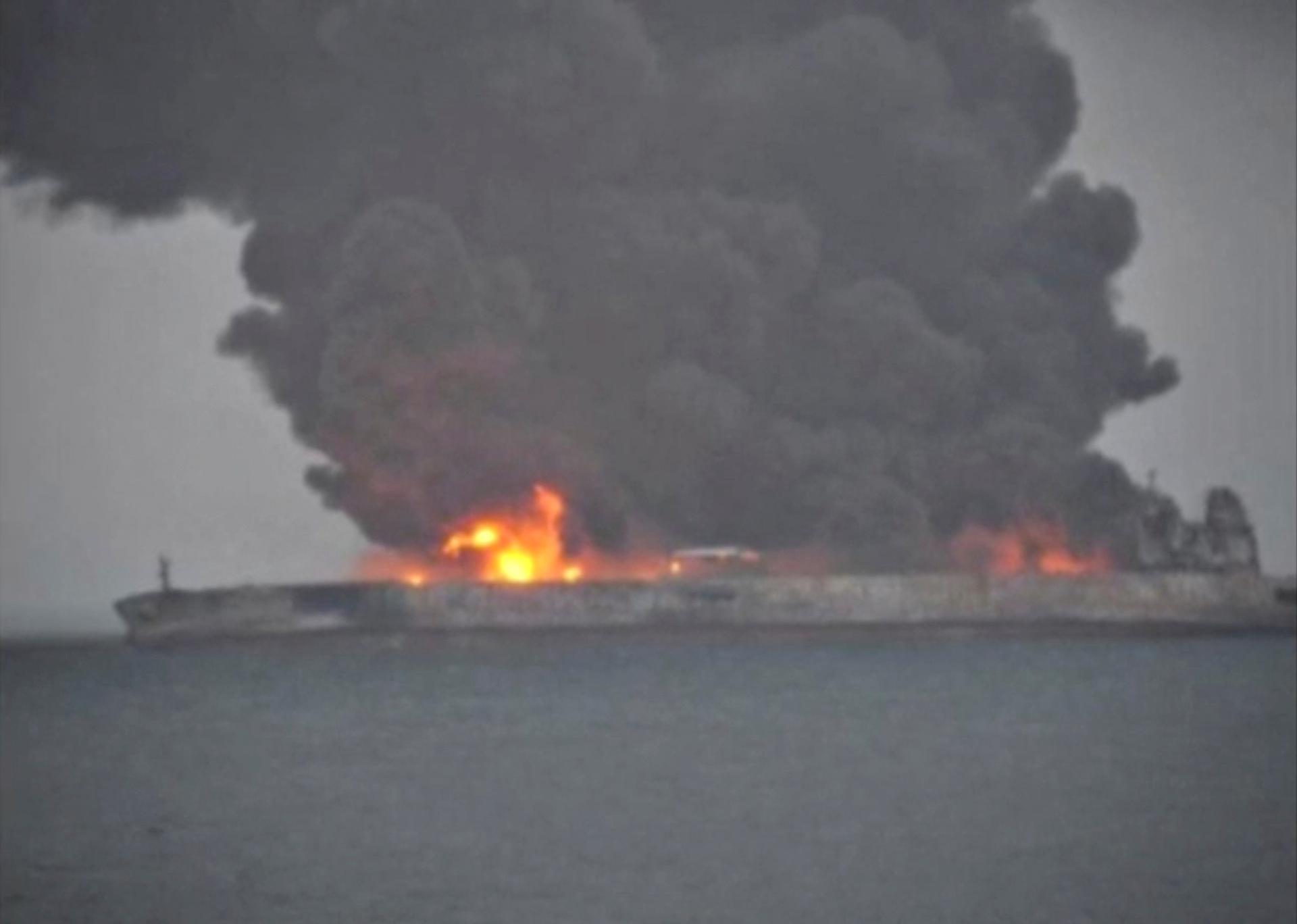Explosion risk for oil tanker ablaze off China’s east coast
Smoke and fire is seen from the oil tanker Sanchi after it collided with a Chinese freight ship in the East China Sea, Jan. 7, 2018.
An Iranian oil tanker ablaze off China's east coast was at risk of exploding or sinking on Monday, as fears grew for 32 missing sailors amid warnings of a potential environmental disaster.
The huge fire was still raging Monday morning around the stricken vessel, which had been carrying 136,000 tons of light crude oil, some 36 hours after it collided with a cargo ship.
But China's English-language state broadcaster CGTN later posted a video on Twitter showing the fire seemingly under control as a second vessel sprayed it with water.
Earlier the transport ministry said rescuers trying to locate the crew of 30 Iranians and two Bangladeshis were being beaten back by toxic clouds.
The Panamanian-flagged 899-foot tanker Sanchi is "in danger of exploding or sinking", the ministry said.
Rescuers had recovered one unidentified body as of Monday afternoon, said foreign ministry spokesman Lu Kang.
"Conditions … are not that favorable for search and rescue work," he said, adding that "we are also investigating how to prevent any secondary disaster."
The body was found three or four miles from the tanker and "cannot be easily identified" even though the victim had a fire safety vest, Alireza Irvash, from Iran's consulate in Shanghai, told Iranian state broadcaster IRIB.
The accident happened on Saturday evening 160 nautical miles east of the city.
The tanker, operated by Iran's Glory Shipping, was heading to South Korea when it collided with a Hong Kong-flagged cargo ship, the CF Crystal, carrying 64,000 tons of grain.
Ten government vessels and "many fishing ships" were helping with the ongoing rescue and clean up effort, the transport ministry said, adding that a South Korean coastguard ship was also on the scene.
A US Navy aircraft took part in the search on Sunday, scouring a wide area before returning to Kadena Air Base in Okinawa, Japan.
Environmental fears
As Chinese authorities raced to contain the ship's leaking oil, experts expressed fears the accident could create an environmental disaster.
Greenpeace said in a statement it was "concerned about the potential environmental damage that could be caused by the 1 million barrels of crude oil on board."
If all of the Sanchi's cargo spills, it would be the biggest oil slick from a ship for decades.
By comparison, in the sixth-worst spill since the 1960s, the Odyssey dumped 132,000 tons some 700 nautical miles off Canada's Nova Scotia in 1988, according to figures from the International Tanker Owners Pollution Federation website.
"It's very possible this will kill off marine life across a wide area," Wei Xianghua, an environmental expert at Beijing's Tsinghua University, told AFP.
Even under a best-case scenario, it would take a "long time" for the area to get back to normal, Wei added.
"At present, the only thing to be done is make the best effort to not allow the oil to spread to other places."
China had two vessels working to contain the spill early Monday morning, the transport ministry said.
Iran's Petroleum Ministry said the tanker belongs to the National Iranian Tanker Company (NITC) and was delivering its cargo to South Korea's Hanwha Total. The ship and its cargo were insured, a statement said.
It was the second accident in less than two years involving a tanker owned by the NITC. In August 2016 an Iranian supertanker and a container ship collided in the Singapore Strait, causing damage to both vessels but no injuries or pollution.
Saturday's collision was the latest in a series of fatal maritime accidents in East Asia in recent years.
Last October, 13 crew on a Chinese fishing boat were killed after their vessel collided with a Hong Kong oil tanker off Japan's west coast.
US Navy vessels have also been involved in recent accidents, including a collision between the USS John. S. McCain and a tanker off Singapore last August that killed 10 sailors.
by Ben Dooley/AFP
Our coverage reaches millions each week, but only a small fraction of listeners contribute to sustain our program. We still need 224 more people to donate $100 or $10/monthly to unlock our $67,000 match. Will you help us get there today?
